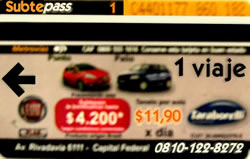PRACTICAL INFORMATION ABOUT ARGENTINA (travel guide)
VISAS IN ARGENTINA
No visa is necessary for most countries (check with the Argentine Embassy in your home country). The tourist visa will allow you 90 days in Argentina for tourism or business.
WHAT TO BRING TO ARGENTINA
We suggest you bring Spanish Dictionary, a Spanish phrase book, a travel guide book and a Spanish grammar book in your own language. It is also nice to bring a small gift for the guest family where you will be while studying Spanish and, obviously, your personal things. In Buenos Aires you can really buy anything you could need or possibly think of so there is no need to worry about what to bring.
JETLAG
Jetlag is caused by disruption of your "body clock" - a small cluster of brain cells that controls the timing of biological functions (circadian rhythms), including when you eat and sleep. The body clock is designed for a regular rhythm of daylight and darkness, so that it is thrown out of "sync" when it experiences daylight and darkness at the "wrong" times in a new time zone. The symptoms of Jetlag often persist for days while the internal body clock slowly adjusts to the new time zone.
Abstaining from alcoholic beverages while on board (and drinking lots of water instead) is both a physical and a mental remedy--it helps to offset dehydration and it promotes mental clarity. There is no quick fix to alleviate all the symptoms of jetlag. There is no single pill or remedy for all these symptoms. We can cope, however, with a little consciousness in our daily life. First of all, spend some time outside during daylight hours. Even being in a room with windows helps to enlighten our body clocks. It is also important to adjust your bedtime to the new, local timetable as soon as possible. Along with the adoption of the local bedtime, try doing what the locals do: their food preferences, meal times, recreational activities, and even the way they dress.
CLIMATE IN ARGENTINA
Due to Argentina's diversity in geography, the climate varies from region to region. Winter in Argentina begins in July and lasts until October, where the summer extends from December to March. The winter is cold, rainy, and has short days, whereas the summers are hot and humid with longer days. It is recommended that students bring a wet weather coat and a warm coat for the nights during the winter.
MONEY IN ARGENTINA
The currency of Argentina is the Argentine Peso. At the time of writing, US$ 1 equals 3,30 Argentine peso. Most credit cards are accepted and ATMs are found throughout the cities but the money you can withdraw daily is sometimes limited (300 pesos daily).
TRANSPORT IN ARGENTINA
Traffic accidents are the primary threat to life and limb in Buenos Aires and Argentina. Pedestrians and drivers should exercise caution. Drivers frequently ignore traffic laws and vehicles often travel at excessive speeds.

Public transportation is generally reliable and safe. The preferred option for travel within Buenos Aires and other major cities is by radio taxi or "remise" (private car with driver). The best way to obtain safe taxis and remises is to call for one or go to an established stand, rather than hailing one on the street. Hotels, restaurants and other businesses can order remises or radio taxis, or provide phone numbers for such services, upon request.
Passengers on buses, trains, and the subway ("el subte") should be alert for pickpockets and should also be aware that these forms of transport are sometimes interrupted by strikes or work stoppages.
Driving in Argentina is generally more dangerous than driving in the United States. By comparison, drivers in Argentina tend to be very aggressive, especially in the capital city of Buenos Aires, and frequently ignore traffic regulations. U.S. driver's licenses are valid in the capital and the province of Buenos Aires, but Argentine or international licenses are required to drive in the rest of the country.
RECOMMENDED BOOKS
Guidebooks
Lonely Planet ARGENTINA, by Rob Rachowiecki
Novels
We recommend you the following and Latin American writers:
Gabriel García Márquez (Latin American)
Isabel Allende (Latin American)
Julio Cortázar (Latin American)
Angeles Mastretta (Latin American)
Laura Esquivel (Latin American)
WORKING OPPORTUNITIES IN BUENOS AIRES
Officially, your tourist visa does not allow you to work and it is a little complicated to get a working permit. However, there certainly are working opportunities to stay a little bit longer in Buenos Aires and work. Most of these jobs are in restaurants and bars and what you should do is just pop by once you are in Buenos Aires. It will be hard to arrange something beforehand via the internet. You can also try to get a job as an English Teacher at one of the Language Schools but these jobs are normally for native, qualified English teachers only. There might be a couple of agencies that could want to make a deal with you although this is more difficult.
We also hire people at the Spanish language school so please don't hesitate to contact us if you are interested (either in exchange for Spanish classes or not).
AMAUTA SPANISH SCHOOL also hires foreign people (either in exchange for Spanish classes or not).
|